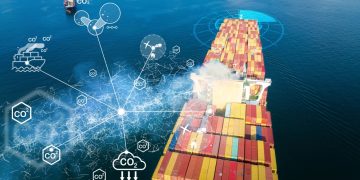ABS has published a new whitepaper regarding the potential of the latest digital technologies to advance safety performances of the global floating production storage and offloading (FPSO) fleet.
The ABS Whitepaper Enhancing Safety on FPSOs: Leveraging Digital Technologies considers how technologies such as remote inspection and digital twins are giving the industry an opportunity to rethink the methods to conduct asset inspections and collect and evaluate condition data.
The whitepaper explores the latest Artificial Intelligence tools used to aid in corrosion detection and measurement and the potential of an accurate digital condition model, or “digital twin” to support modern risk-based inspection techniques.
Benefits and challenges
Utilizing RIVs (remote inspection vehicles) to conduct inspections, rather than using an inspector, is safer as it limits surveyors, inspectors, or maintenance personnel to access and work in potentially hazardous conditions.
When working at height, personnel risk falling and being severely injured. There are potential risks of deadly atmospheres, fires, and explosions in confined spaces. While underwater, there are risks of drowning and hypothermia. In addition to personal safety, reducing worker interactions onboard may include reductions of many costly and potentially damaging preparations for inspection activities.
This can minimize cleaning and ventilating requirements and limit the need or amount of worker means of access, such as ladders, staging, rope climbing, and elevated work platforms. These can reduce potential damage to the vessel, worker risk, and downtime and mitigate or eliminate their associated costs.
Additionally, RIVs can significantly reduce the interruption to FPSO production-related activities and associated costs. Although the switch to RIT seems obvious, there are many challenges for each type of technology. For example, service supplier training, battery usage/conservation techniques, photo/video resolution, data consistency, metadata, localization of data, tethered/non-tethered, and data processing. More details are provided in the ABS Guidance Notes on Remote Inspection Technologies.
The FPSO fleet is in the midst of a generational shift in the technology available to support offshore operations. For 50 years, maintenance management and condition evaluation have been a labor intensive, analog exercise.
…said Matt Tremblay, ABS Vice President, Global Offshore, adding also that “As a safety focused organization operating at the forefront of these technologies, ABS is able to share the insight we have learned with the industry to support the adoption of new tools and systems that improve both safety and performance.”

































































